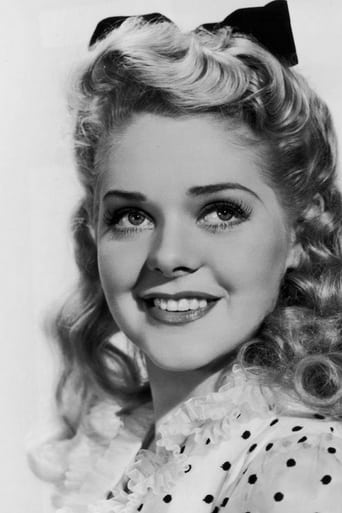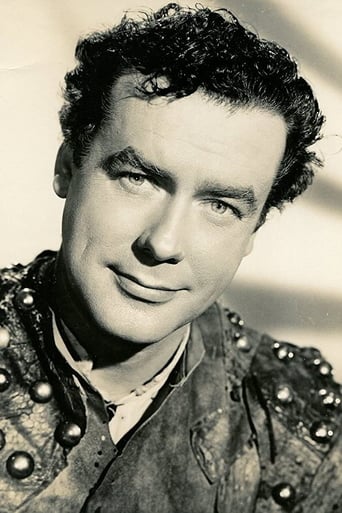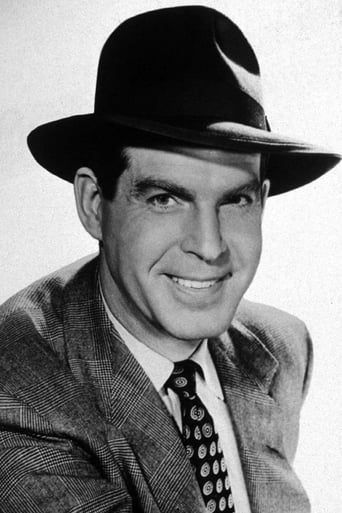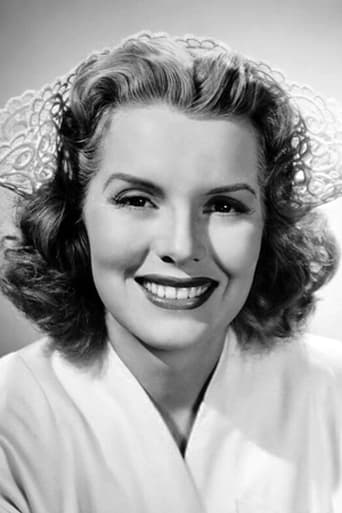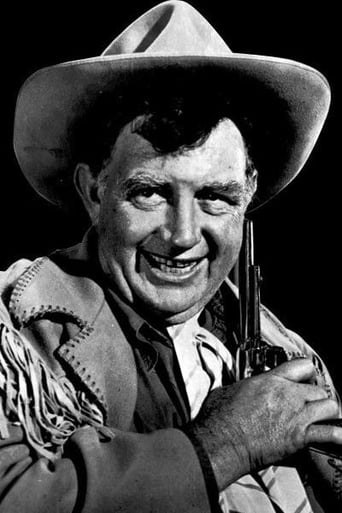Gutsycurene
Fanciful, disturbing, and wildly original, it announces the arrival of a fresh, bold voice in American cinema.
weezeralfalfa
Charming screenplay and excellent choice of actors. A hidden gem! A mix of historical facts and persons and purely fictional events and persons, as was the norm for this period of Hollywood biopics. Thus, Robert Livingston and Nikolas Roosevelt are included among the financiers or politically influential in getting the first steamboat on the Hudson built. Harriet Livingston: niece of Robert Livingston, is also included as Fulton's(Richard Greene)fiancé(and wife, in real life). On the other hand, Charles Browne(Fred MacMurray): the man who organized the building of the hull for Fulton's boat, is fictional(I assume). Andy Devine's comical 'Commodore' character runs ferryboats out of Manhattan, having browbeaten his competition into giving up. Alice Faye's role as Pat O'Day, who runs a dockside tavern and accommodates Fulton in her rooms upstairs, is also fictional, I assume. Ward Bond plays Ragen: the chief organizer of opposition to building a steamboat, on grounds that sailors will lose their jobs if steamboats replace sailing ships. For those who like to see an occasional brawl, Fulton and Ragen tangle over Fulton's small model of his boat. Later, there is a big brawl after Fulton's model is destroyed...For those who like some comedy, there's plenty of light humor, mostly involving Alice Faye or Andy Devine, or Noah(Ben Carter, who was Alice's African American assistant. Although Alice helped Fulton in various ways and hoped to marry him, when they first met, Alice threw a wet towel at MacMurray , who ducked, it hitting Fulton in the face. Later, Alice bursts into a formal dinner hosted by Livingston with Fulton's boat model, thinking he forgot it, to everyone's amusement or embarrassment...For music, there is a group sing of the Mack Gordon-composition "Who is the Beau of the Bell of New York". There's plenty of drama at the personal level as well as relating to the steamboat. Ward organizes several sabotage operations that nearly kill the project. Then, the Embargo Act threatens to prevent the landing of the steam engine from England. There's drama relating to Fulton's attempts to get funding. Of course, there's some drama relating to the launching of the boat(like will it blow up?)Several caveats relating to the name of the boat and to the question of Fulton's priority in launching a successful steamboat are in order. The boat was originally called the North River Steamboat. Some years later, it would be called the Clermont, as it is called in this film. A full scale mockup of a replica of this boat was made for the film. Fulton did not build the first working steamboat in the US. John Fitch is generally credited with that feat. 10-20 years before Fulton's boat, he built 4 working steamboats, some of which carried passengers on the Delaware River. But, he never was able to make it a paying operation, which is what Fulton did. A few years later , Fulton launched a series of boats from Pittsburg that went down the Mississippi to New Orleans, thus opening up steam traffic in the Mississippi and Ohio basins. MacMurray's character considered the possibility that steamships might ply the oceans. He concluded that probably they wouldn't be able to carry enough fuel plus cargo to make it pay. A number of factors eventually made this practical. More powerful, more efficient, steam engines were built, coal, instead of wood was the fuel, and the adoption of the screw propeller were some of the major factors, along with hybrid sail-steam ships. My review title is derived from a query by Fulton, when he first met Harriet Livingston. I suspect this was arranged to sound like "Dr. Livingston, I presume", attributed to Stanley. The director: Henry King, had just finished directing the film "Stanley and Livingston". King had also previously directed "In Old Chicago", which also included Alice Faye. Tyrone Power and Don Ameche took the roles herein played by Greene and MacMurray.Poor Alice Faye's character wanted so much to marry a gentleman, and felt that Fulton owed her a marriage proposal for what she had done for him. But Fulton preferred the airy Harriet and the upper crust of New York society. She might have found a role as his mistress.See this B&W picture at YouTube or the DVD.
bkoganbing
Robert Fulton after trying and failing to develop a ship powered by a steam engine is having trouble getting some new backing. A prototype vessel blew up on the River Seine as he was trying to impress Napoleon Bonaparte with steam's potential. Now he's back in Little Old New York trying to sell the idea to the movers and shakers of his day.Richard Greene plays the idealistic and gentlemanly Fulton. But the only two converts he makes are his landlady, tavern owner Alice Faye and Fred MacMurray, who works for Ward Bond at a shipyard. But after Fulton beats bully boy Bond in a fight, MacMurray loses his job. But Fred starts his own shipyard and his first client will be Fulton if he can raise the money.Little Old New York had the story of Robert Fulton grafted on to a play by Rida Johnson Young of the same name that was the basis for the film. There's no mention that in real life Fulton was as handy with his dukes as he is in this film. It is true he married the niece of Chancellor Robert Livingston played by Brenda Joyce and Livingston did finally sell some of his friends like Nicholas Roosevelt, John Jacob Astor, and Washington Irving to finally back Fulton's steamboat.Livingston is played by one of my favorite character actors Henry Stephenson who always brings a touch of old world class to all his roles. Livingston's title of Chancellor stems from the fact the chief judicial officer of New York had that title, a carryover from colonial days. Among other things Livingston did was swear in George Washington to his first term as president. There was no Supreme Court yet because Washington hadn't appointed anyone yet.Little Old New York probably was seen by Darryl Zanuck as a fitting sequel to In Old Chicago which was Alice Faye's first period costume film. The parts that Fred MacMurray and Richard Greene have are those that would normally have been played by Tyrone Power and Don Ameche. In fact I could see both of those guys playing either of the MacMurray or Greene parts. If Little Old New York is not the real story of Robert Fulton it certainly is a nice bit of entertainment served up by a fine cast at the direction of Henry King.
Enrique Sanchez
Richard Greene and Alice Faye are extremely likeable in this memorable movie about "Fulton's Folly" and his eventual success with the Steam Engine driven Paddle boat. An invention that changed America and contributed greatly to the prosperity of the newly independent America.It is a shame that Greene, though he did achieve some fame, did not achieve the name status his debonair looks and likeable charm deserved.Fred MacMurray, Andy Devine, Ward Bond and Fritz Feld have wonderful smaller roles. The perfect music of Alfred Newman gives each moment just the right effect and feeling.I recommend this movie even if one already knows what the ending shall bring. History told this enjoyably affords us the chance to relive the wonderful moments in the struggles necessary to bring about man's achievements.
scrufboy
Nothing deep, but an interesting Hollywood-ized account of the development of steam propeled ships. Imagine... being able to propel a vessel upstream even into the wind! But at what risk? The current economy's support? And how do you pay for the thing?!?! Additionally, you have a young country out to protect its interests... but what if it acted Isolationistically? Would you be able to pursue your dreams? If the overdeveloped subplots of "Sink the Bismark" did'nt offend your sensibilities greatly, you will enjoy this yarn.
